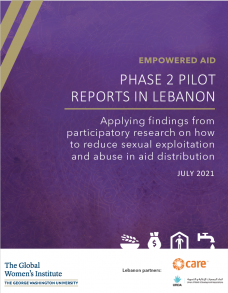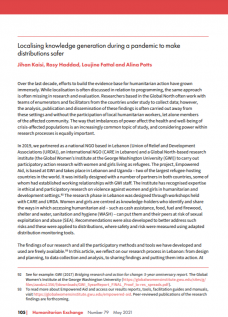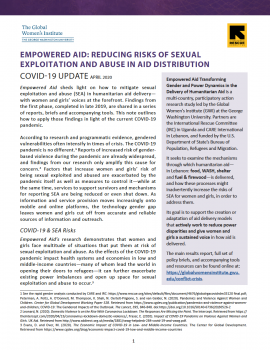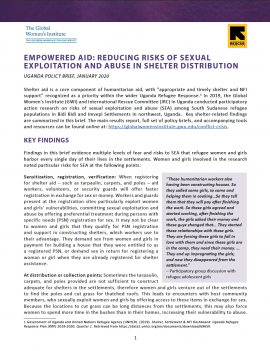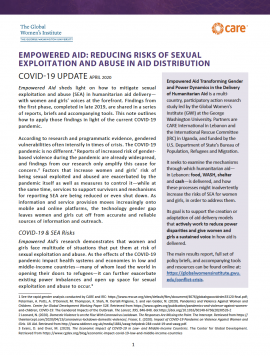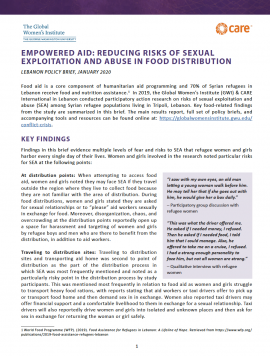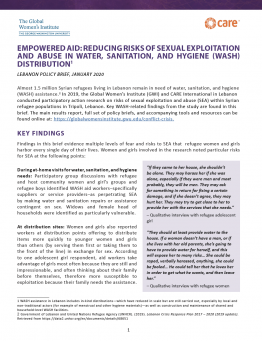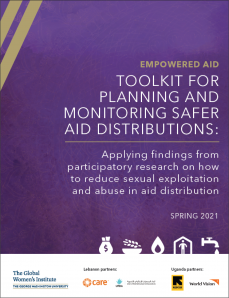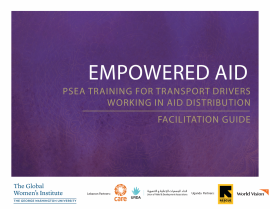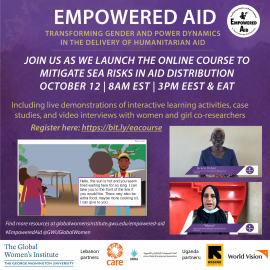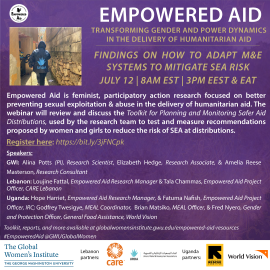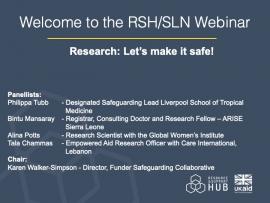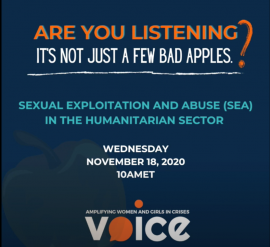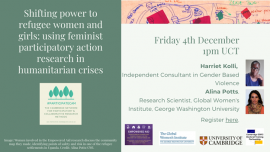Empowered Aid Resources
Pilot Reports in Lebanon and Uganda
Phase 2 Pilot Reports in Lebanon
This booklet shares the reports from the two pilots conducted in Lebanon – a fuel voucher distribution and a food distribution – to test recommendations made by women and girls that could increase their safety at aid distributions. The booklet contains the summary report for each pilot as well as individual reports for each of the tools used during the distribution. The tools used by the distribution team, and how they planned for the distributions can be found in the Toolkit for Planning and Monitoring Safer Aid Distributions on the “Manuals and Toolkits” tab..
Phase 2 Pilot Reports in Uganda
This booklet shares the reports from the four pilots conducted in Uganda – the first food distribution, dignity kit distribution, the second food distribution, and a solar lamp distribution – to test recommendations made by women and girls that could increase their safety at aid distributions. The booklet contains the summary report for each pilot as well as individual reports for each of the tools used during the distribution. The tools used by the distribution team, and how they planned for the distributions can be found in the Toolkit for Planning and Monitoring Safer Aid Distributions on the “Manuals and Toolkits” tab.
Localising knowledge generation during a pandemic to make distributions safer
Co-authored with our Empowered Aid Lebanon partners URDA and CARE, our latest article is published in the Humanitarian Practice Network's Humanitarian Exchange's May issue on Localisation and local humanitarian action. It shares reflections from Jihan Kaisi and Rosy Haddad, Executive Director and Public Relations Officer (respectively) with the Union of Relief and Development Associations (URDA), a Lebanese NGO; Loujine Fattal, Empowered Aid Lebanon Research Manager with CARE in Lebanon; and Alina Potts, Empowered Aid Primary Investigator, of GWI. They reflect on localization in humanitarian research and knowledge generation processes during the COVID-19 pandemic, using our Empowered Aid work in Lebanon as a case study. This article was also an opportunity to support local partners in publishing for the first time, as lead authors--an important aspect of centering local knowledge and decolonising research processes.
Empowered Aid in Uganda
Empowered Aid: Participatory action research with refugee women & girls to better prevent sexual exploitation & abuse | Uganda Country Report
This report shares findings from the first phase of Empowered Aid in Uganda around risks of sexual exploitation and abuse in relation to food, WASH, shelter, and fuel & firewood, throughout the distribution process. It is based on rigorous, longitudinal qualitative research with women and girls living in Bidi Bidi and Imvepi refugee settlements in Uganda. The report also summarizes findings related to other types of distribution-related gender-based violence. It provides targeted, action-oriented recommendations to make aid distributions safer for women and girls, grounded in their own voices
Empowered Aid: Participatory action research with refugee women & girls to better prevent sexual exploitation & abuse | Uganda Policy Brief
This brief shares findings from the first phase of Empowered Aid in Uganda around risks of sexual exploitation and abuse in relation to food, WASH, shelter, and fuel & firewood, throughout the distribution process. It is based on rigorous, longitudinal qualitative research with women and girls living in Bidi Bidi and Imvepi refugee settlements in Uganda. It provides targeted, action-oriented recommendations to make aid distributions safer for women and girls, grounded in their own voices.
Empowered Aid: Participatory action research with refugee women & girls to better prevent sexual exploitation & abuse | Uganda COVID-19 Brief
This brief summarizes recommendations to prevent & respond to SEA in the context of COVID-19.
Empowered Aid: Participatory action research with refugee women & girls to better prevent sexual exploitation & abuse | Uganda Sector-Specific Briefs:
Empowered Aid Uganda sector brief: SEA in relation to Food Aid
This brief summarizes key findings around SEA in relation to food distribution and provides targeted recommendations to make food distribution safer for women and girls.
Empowered Aid Uganda sector brief: SEA in relation to WASH Assistance
This brief summarizes key findings around SEA in relation to WASH and provides targeted recommendations to make WASH assistance safer for women and girls.
Empowered Aid Uganda sector brief: SEA in relation to Shelter Assistance
This brief summarizes key findings around SEA in relation to shelter aid and provides targeted recommendations to make shelter-related distributions safer for women and girls.
Empowered Aid Uganda sector brief: SEA in relation to Fuel & Firewood Assistance
This brief summarizes key findings around SEA in relation to fuel & firewood and provides targeted recommendations to make fuel & firewood assistance safer for women and girls.
Empowered Aid in Lebanon
Empowered Aid: Transforming Gender and Power Dynamics in the Delivery of Humanitarian Aid | Lebanon Country Report
This report shares findings from the first phase of Empowered Aid in Lebanon around risks of sexual exploitation and abuse in relation to food, WASH, shelter, and cash assistance, throughout the distribution process. It is based on rigorous, longitudinal qualitative research with women and girls living in an urban refugee context in Tripoli, Lebanon. The report also summarizes findings related to other types of distribution-related gender-based violence. It provides targeted, action-oriented recommendations to make aid distributions safer for women and girls, grounded in their own voices.
Empowered Aid: Participatory action research with refugee women & girls to better prevent sexual exploitation & abuse | Lebanon Policy Brief
This brief shares findings from the first phase of Empowered Aid in Lebanon around risks of sexual exploitation and abuse in relation to food, WASH, shelter, and cash assistance, throughout the distribution process. It is based on rigorous, longitudinal qualitative research with women and girls living in an urban refugee context in Tripoli, Lebanon. It provides targeted, action-oriented recommendations to make aid distributions safer for women and girls, grounded in their own voices.
Empowered Aid: Participatory action research with refugee women & girls to better prevent sexual exploitation & abuse | Lebanon COVID-19 Brief
This brief summarizes recommendations to prevent & respond to SEA in the context of COVID-19.
Empowered Aid: Participatory action research with refugee women & girls to better prevent sexual exploitation & abuse | Lebanon Sector-Specific Briefs:
Empowered Aid Lebanon sector brief: SEA in relation to Food Aid
This brief summarizes key findings around SEA in relation to food distribution and provides targeted recommendations to make food distribution safer for women and girls.
Empowered Aid Lebanon sector brief: SEA in relation to WASH Assistance
This brief summarizes key findings around SEA in relation to WASH and provides targeted recommendations to make WASH assistance safer for women and girls.
Empowered Aid Lebanon sector brief: SEA in relation to Shelter Assistance
This brief summarizes key findings around SEA in relation to shelter aid, and provides targeted recommendations to make shelter-related distributions safer for women and girls.
Empowered Aid Lebanon sector brief: SEA in relation to Cash Assistance
This brief summarizes key findings around SEA in relation to cash assistance, and provides targeted recommendations to make cash assistance safer for women and girls.
Empowered Aid Toolkit for Planning and Monitoring Safer Aid Distributions
This toolkit applies findings and recommendations shared by women and girls from participatory research on how to reduce sexual exploitation and abuse in aid distribution. The distribution monitoring tools contained in this toolkit have been modified to better account for sexual exploitation and abuse (SEA) risks. The Toolkit includes four adapted distribution monitoring tools: a (1) a safety audit or observational monitoring tool, (2) a point of distribution questionnaire, (3) household survey, and (4) a focus group discussion tool with guidance on how to plan, train, collect data, and conduct analysis using the adapted tools. These tools can be used to proactively identify and address known barriers and risks for SEA that inhibit aid distributions from being safe for women and girls. A shared drive of additional resources and templates to support toolkit users is available at https://gwu.app.box.com/v/eamonitoringtoolkitannex.
The Toolkit and accompanying shared drive files are now available in Arabic, French, and Spanish.
Toolkit Training for Humanitarian Practitioners
This training guide is accompanies the Empowered Aid Toolkit for Planning and Monitoring Safer Aid Distributions, training humanitarian practitioners how to utilize the tools, design safer distributions, and reduce the risk of SEA associated with distributions. Click here to view the accompanying slideshow. This training guide and PowerPoint presentation can also be accessed through the Toolkit shared drive: https://gwu.app.box.com/folder/139474683898?s=8b9cfloeemunjqd6gwrbae1ioss7vwse
PSEA Training for Transport Drivers Working in Aid Distribution
This training guides outlines specific ways in which humanitarian actors can provide PSEA training for transport drivers. The aim of conducting this training is to increase the understanding of SEA posed to aid recipients related to transportation. Click here to view the day one and day two presentations for this training guide. This training guide and PowerPoint presentation can also be accessed through the Toolkit shared drive: https://gwu.app.box.com/v/eamonitoringtoolkitannex
Empowered Aid Participatory Action Research Toolkit
This toolkit contains key research tools used, such as the Participatory Group Discussion (PGD) and Qualitative Interview guides used.
Empowered Aid Participatory Action Research (PAR) Training Curriculum & Facilitation Guide
The Participatory Action Research training curriculum & facilitation guide was used with research team members -- humanitarian staff as well as women and girls from refugee communities -- to guide processes for shared study design and implementation. It includes core trainings around gender, GBV and SEA.
Empowered Aid Research Reflection Workshop Facilitation Guide
The Reflection Workshop facilitation guide outlines processes for holding space to reflect and share feedback on the research process. These workshops were conducted halfway through the qualitative fieldwork, providing the opportunity for the research team to adjust the process as needed and in response to feedback from women, girls, and humanitarian staff’s feedback.
Empowered Aid Action Analysis Workshop: Facilitation Guide for Research Partner Staff
The Action Analysis Workshops facilitation guide outlines the process through which participatory data analysis was conducted with a special emphasis on visual methods for use with low-literacy populations. This guide is for the Research Partner Staff who will facilitate the workshops with the women & girl researchers.
Empowered Aid Action Analysis Workshop: Facilitation Guide for Women & Girl Researchers
The Action Analysis Workshops facilitation guide outlines the process through which participatory data analysis was conducted with a special emphasis on visual methods for use with low-literacy populations. This guide is for the Women & Girl Researchers who took part in the data collection process.
Empowered Aid Webinar Launch: Online Course
On October 12, 2021, The Empowered Aid team held a virtual launch of the new online course to mitigate risks of sexual exploitation and abuse (SEA) in aid distributions, which you can watch the live recording of here. The course aims to help learners gain a better understanding of SEA risks and shares recommendations and tools to mitigate them, drawn from Empowered Aid’s participatory action research with refugee women and girls in Uganda and Lebanon over the last three years. Interactive case studies, quizzes, and video interviews share Empowered Aid’s findings, recommendations, and participatory processes for listening to women and girls, and increasing their safety by putting their words into action. In the webinar, our multi-country team who co-designed the course shared “sneak peeks,” demonstrated course features, and hosted a Q&A. If you are interested in enrolling in the course, visit the Course webpage.
Speakers:
GWI: Alina Potts (PI), Research Scientist, Elizabeth Hedge,
Uganda: Hope Harriet, Empowered Aid Research Manager, Brian Matsiko, MEAL Officer, & Fred Nyero, Gender and Protection Officer, General Food Assistance, World Vision
Lebanon: Loujine Fattal, Empowered Aid Research Manager & Tala Chammas, Empowered Aid Project Officer, CARE Lebanon
Empowered Aid Animated Video of the Phase 2 Pilot Findings to Mitigate SEA in Lebanon
The Empowered Aid Lebanon team in CARE International in Lebanon with the support of the GWI team developed an animated video to summarize the findings of the Phase II aid distribution pilots implemented in partnership with Union of Relief & Development Associations (URDA) in Lebanon. The animated video is an example of how to communicate back findings visually and creatively with women, girls, and affected communities, in which literacy may be a barrier.
Video Citation: Karim Koleilat, Independent animator, and CARE International in Lebanon. Beirut: Lebanon.
Webinar Launch of the Toolkit for Planning and Monitoring Safer Aid Distributions
In July 2021, the Global Women's Institute (GWI) hosted a virtual launch of the Empowered Aid Toolkit for Planning and Monitoring Safer Aid Distributions. This toolkit is based on six pilots conducted in Lebanon and Uganda by GWI and partners CARE and URDA in Lebanon, and IRC and World Vision in Uganda. You can watch the full recording, with team members from GWI and partners in both countries who review the contents of the toolkit, share case studies of using it, and host a Q&A with practitioners and researchers on how to further adapt and apply it. The team provided written answers to the questions during the Q&A portion of the webinar, which can be accessed here.
The Toolkit for Planning and Monitoring Safer Aid Distributions can be found under the “Manuals and Toolkits” tab, and a shared drive of additional resources and templates to support toolkit users is available at https://gwu.app.box.com/v/eamonitoringtoolkitannex.
Speakers:
GWI: Alina Potts (PI), Research Scientist, Elizabeth Hedge, Empowered Aid Research Associate, & Amelia Reese Masterson, Empowered Aid Research Consultant
Lebanon partners: Loujine Fattal, Empowered Aid Research Manager & Tala Chammas, Empowered Aid Project Officer, CARE Lebanon
Uganda partners: Hope Harriet, Empowered Aid Research Manager, & Fatuma Nafish, Empowered Aid Project Officer, IRC; Godfrey Twesigye, MEAL Coordinator, Brian Matsiko, MEAL Officer, & Fred Nyero, Gender and Protection Officer, General Food Assistance, World Vision
Research: Let's make it safe!
Empowered Aid's Primary Investigator Alina Potts, alongside Empowered Aid Lebanon Research Officer Tala Chammas, recently participated in a webinar organized by the UK Government's Safeguarding Resource & Support Hub (RSH). Through this webinar, participants were able to understand and consider what needs to be in place specifically when making research, programs, and monitoring and evaluation safe for both participants and researchers. Alina and Tala share their own experiences on the ground in both Uganda and Lebanon and explore in what ways Empowered Aid utilizes various participatory methodologies in relation to training and risk management, especially given the sensitivity of sexual exploitation, abuse, and sexual harassment (SEAH) in the COVID-19 pandemic. The webinar recording can be accessed here, as well as follow along the Q&A and presentation slides here.
Advocating for Victims' Rights in the United Nations: A Conversation with Jane Connors
Moderated by GW’s Alina Potts, Global Women’s Institute, & Ramin Asgary, Humanitarian Health Program, with a student-led Q&A
The Global Women’s Institute and GWU Humanitarian Health Program at the Milken Institute School of Public Health hosted the United Nation’s first Victim’s Rights Advocate Jane Connors in a conversation on preventing sexual exploitation and abuse in the humanitarian sector and centering victim’s rights in its approach. The Question & Answer portion was hosted by students from the George Washington University, engaging Ms. Connors on challenges, solutions, and next steps for her role and office. You can watch the recording here and for more information on the speakers, click here.
Are You Listening? It's Not Just A Few Bad Apples: Sexual Exploitation and Abuse (SEA) In The Humanitarian Sector
Alongside colleagues in the humanitarian aid sector, GWI Research Scientist Alina Potts discussed the implications of continuous and widespread sexual exploitation and abuse (SEA) from within the humanitarian aid sector. Utilizing her decade-long experience as a GBV practitioner and key findings from Empowered Aid, Alina asserts the importance in developing and implementing feminist-centered policy change in order to give women and girls a sustained voice and power in the aid system. Key topics discussed include lack of accountability in the aid sector, a dearth of female representation in positions of power, and the need to shift to a transformative, feminist approach. You can watch the video here.
Shifting power to refugee women and girls: using feminist participatory action research in humanitarian crises
Empowered Aid’s Principal Investigator, Alina Potts, and Uganda Research Manager for Phase 1, Harriet Kolli, joined the University of Cambridge Network for Participatory and Collaborative Research Methods to talk about “Shifting Power to Refugee Women and Girls: Using Feminist Participatory Action Research in Humanitarian Crises”, based on Empowered Aid’s participatory action research in Uganda and Lebanon. You can watch the video here.
Empowered Aid Findings presented at the UK Parliament House of Commons Oral Evidence Session on Sexual Exploitation and Abuse in the Aid Sector
GWI Research Scientist Alina Potts served as a witness in the UK Parliament International Development Committee’s first oral evidence session on sexual exploitation and abuse in the aid sector. Alina delivered oral evidence to the committee members from her experience as an aid worker across emergency responses from DR Congo to Syria to Bangladesh, and shared the voices of Syrian and South Sudanese women and girls engaged in Empowered Aid's action research in Uganda and Lebanon. Key aspects of the conversation centered on the importance of contextual safeguarding to prevent SEA before it happens, and addressing the unequal power dynamics and lack of participation across the sector which underpin this type of abuse. The video and audio recordings are available here and the transcript is available here.
Empowered Aid Findings on cash assistance contribute to Grand Bargain Cash Workstream #GenderCash Conversation
On the second day of the Grand Bargain Cash Workstream meetings, GWI Research Scientist Alina Potts joined practitioners, funders and researchers from CARE, BPRM, the Women’s Refugee Commission and Oxfam for a conversation on how aid actors can further reduce GBV risks in cash and voucher assistance for women and girls. You can watch the video here, and read more about Empowered Aid’s cash findings in Lebanon here.
Empowered Aid Webinar: Phase 1 Results & Recommendations Launch
In honor of World Refugee Day 2020, the Global Women's Institute (GWI) hosted a webinar launch sharing Empowered Aid's Phase I findings and recommendations on reducing risks of sexual exploitation and abuse when accessing humanitarian aid in Lebanon and Uganda. You can watch the full recording with the Empowered Aid team, including the presentation and Q&A discussion.
The full reports and other resources mentioned are available on this web page under the "Reports, policy briefs and articles" and "Manuals and toolkits" tabs.
Speakers
GWI: Alina Potts (PI), Research Scientist & Elizabeth Hedge, Empowered Aid Research Associate
CARE International in Lebanon: Loujine Fattal, Empowered Aid Research Manager & Farah Hallak, Empowered Aid Project Officer
IRC Uganda: Harriet Kolli, Empowered Aid Research Manager & Fatuma Nafish, Empowered Aid Project Officer
Please note: The audio of our Uganda project officer, Fatuma Nafish, is a bit difficult to hear; it is captioned however you can also watch Fatuma speak here. You will have the option to turn on closed captions.
Presentation at the 2019 SVRI Forum
The Empowered Aid team’s presentation at the 2019 Sexual Violence Research Initiative Forum held in Cape town, South Africa.
Women's Protection and Empowerment Podcast: Empowered Aid
Since its magnitude first came to light in 2002, the aid community’s focus on addressing sexual exploitation and abuse (SEA) has primarily rested on establishing reporting mechanisms and only recently shifted toward proactive measures to mitigate risk and prevent such abuses from occurring. In this episode, Alina Potts of the Global Women's Institute, Harriet Kolli of the International Rescue Committee (IRC) Uganda, and Loujine Fattal of CARE Lebanon, discuss Empowered Aid: Transforming gender and power dynamics in the delivery of humanitarian aid on an episode of Women's Protection and Empowerment podcast.


